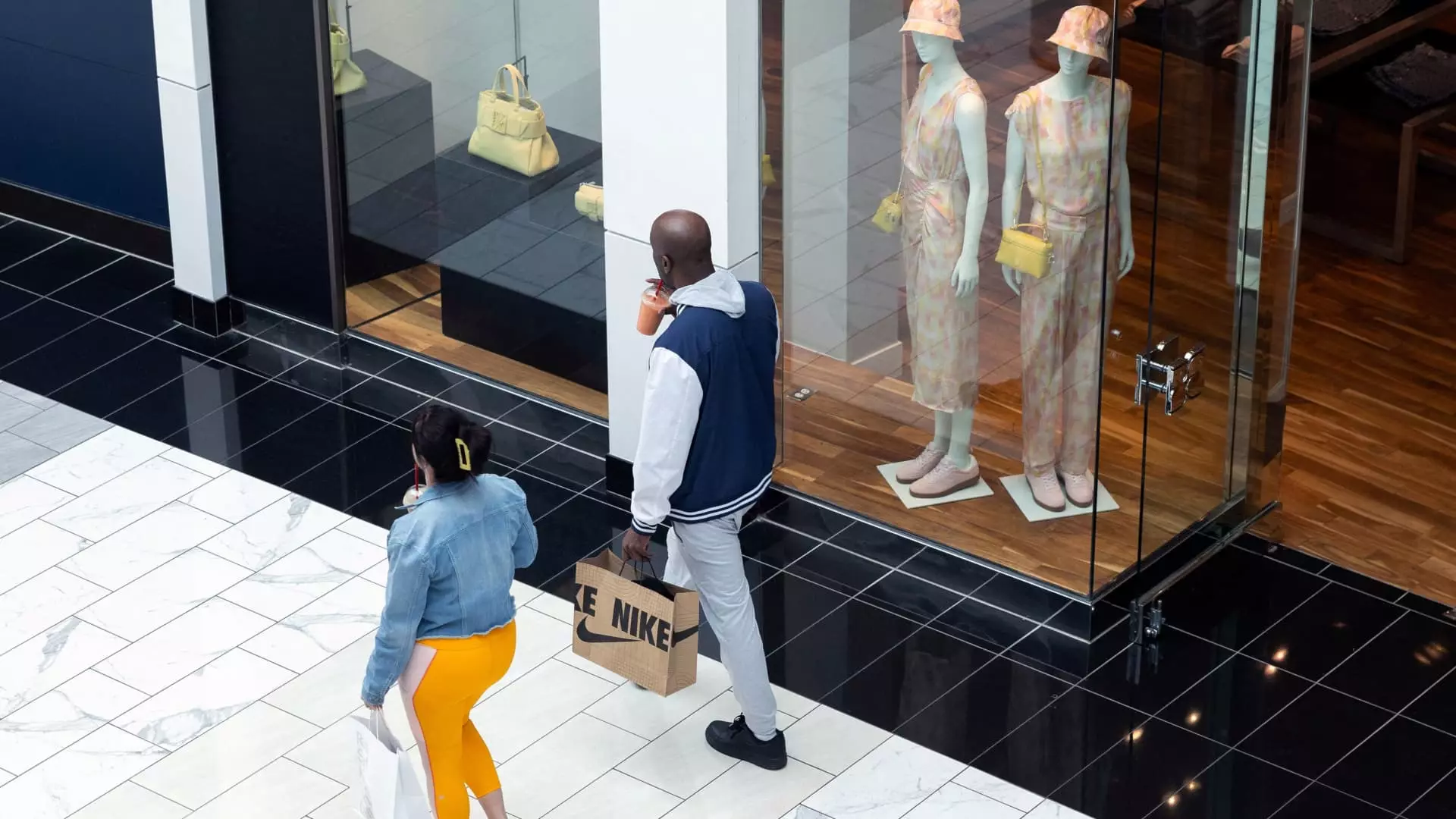The juxtaposition of American consumer spending behavior against a backdrop of growing financial distress is astonishing. As aproximately 73% of adults report financial stress—predominantly attributing their concerns to escalating tariff wars—consumer spending has demonstrated a perplexing tenacity. How can such a significant proportion of the populace express anxiety about their financial futures while simultaneously engaging in robust spending? It’s a classic case of delinquent optimism; people are panic buying, possibly as a hedge against anticipated price hikes linked to impending tariffs. The reality suggests an urgent cognitive dissonance that many are unwilling or unable to reconcile.
According to data from the Commerce Department, consumer spending not only met expectations in March but exceeded them. This resilience is a double-edged sword, as it exposes a deeper issue: the danger of complacency. Financial experts and economists have raised the alarm. J.P. Morgan recently elevated the recession probability for the U.S. and globally to a staggering 60%. This shift hints at a catastrophic undercurrent in a gleaming facade of spending. The irony is palpable—while consumers continue their spending habits, almost half the nation teeters on the brink of financial crisis.
The Tariff Wars: An Enigma Wrapped in Economic Inequality
Federal Reserve Chair Jerome Powell has made it unmistakably clear: consumer spending is the engine driving the economy. Yet, the same tariffs that ostensibly aim to protect American jobs could ironically extend the lifeline to the very consumers feeling shackled by mounting prices. The current administration’s trade policies promise to stoke inflation, which ultimately undermines the purchasing power of the average consumer. It is thus ironic to consider how trade wars, ostensibly aimed at creating economic prosperity, may well be inadvertently sowing the seeds of a recession.
Surveys indicate a menacing decline in consumer confidence, with the Conference Board’s expectations index plunging to its lowest levels in over a decade. Such statistics are alarming, marking a worrying trend that signals recessionary fears gripping the populace. As prices rise, economists warn that consumers’ fears about their finances will inevitably translate into diminished spending capacities. This creates an insidious cycle where lurking financial woes become self-fulfilling prophecies; if consumers cut back due to fearful speculation, businesses will react by curtailing production and laying off workers—a spiral that could lead us straight into recession.
Consumer Behavior: The Clash Between Reality and Inertia
The prevailing economic theories suggest a rational actor model wherein consumers respond logically to changes in their circumstances. However, this model fails to capture the reality of human behavior—particularly when dealing with financial anxieties. Even as individuals recognize their precarious financial situations, protracted behavioral biases and a stubborn inclination towards routine blind many to the necessity of adjustment. Indarte’s observations about this tendency toward “sameness” strike at the heart of our economic challenges.
However, the sobering truth is that as households are squeezed financially, eventually the flicker of the “American dream” will flatten to a dim glow. This shift isn’t merely an academic concern but a tangible reality that will bite into the daily lives of ordinary Americans. Consumers might persist in deluding themselves about their financial health due to their ingrained habits and desires. But when financial constraints inevitably erupt into a crisis, the façade of security will crumble, and this adjusted reality will no longer allow for the indulgent spending that many currently partake in.
Rethinking Our Economic Predictions and Personal Responsibility
As we forge ahead, it becomes essential to evaluate consumer behavior not merely as an economic variable but as a crucial element of the larger economic narrative. The culture of rampant consumerism can no longer be regarded as an unwavering constant; our choices have the power to shape our destinies. The future is riddled with uncertainties, but it is the interplay between individual spending choices and broader economic forces that may prove determinative.
Facing impending financial calamity, Americans must learn to recalibrate their relationship with spending. Acceptance of the grim reality that household budgets are not limitless is the starting point for a necessary economic awakening. The unfortunate truth is that the escalating tariffs and financial strain are not an abstract problem; they resonate within every household budget, and action is imperative.
Ultimately, resolving our economic plight requires not just institutional shifts but a grassroots awakening. Transforming individual behaviors and beliefs will be pivotal in navigating this economic landscape and steering America toward a more sustainable financial future. The path may be complex, but the return to awareness and conscious spending could lay the foundation for a more secure economy.

